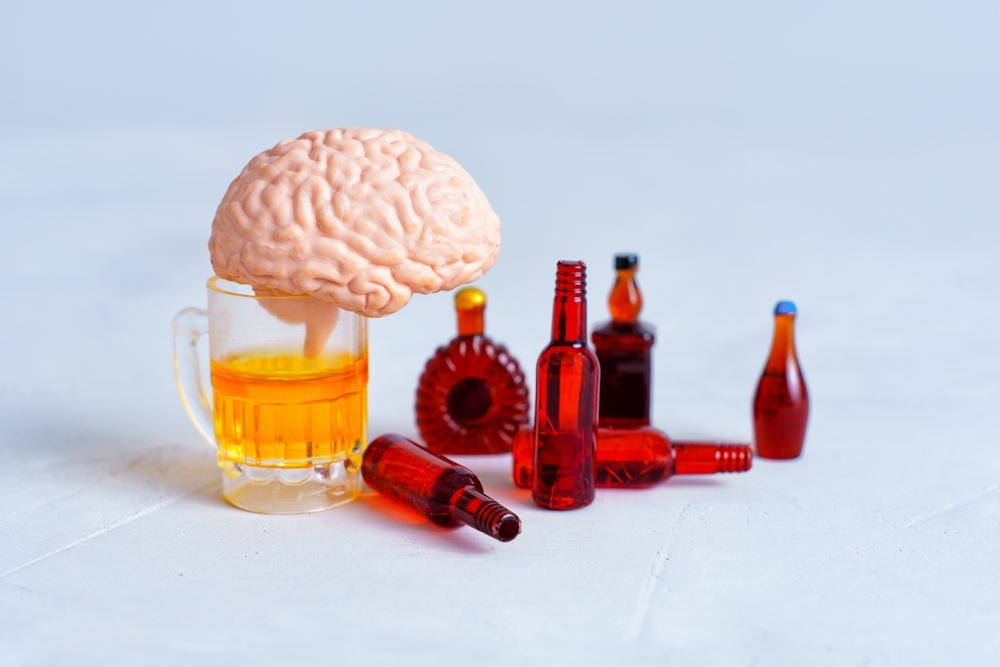
Last Updated:
February 11th, 2025
Between 2022 and 2023, 71% of people in treatment for alcohol addiction reported living with a mental health problem. We know that it is not uncommon for people to turn to alcohol in periods of poor mental health. We also know that long term substance abuse can cause psychological distress. Together, alcohol and mental health problems weave a complex web. This creates a vicious cycle where the original ‘problem’ is often concealed. It can be hard to know which issue came first, or which is ‘causing’ the other. This means that addiction recovery typically needs to be two-pronged. It needs to address our mental health as well as our substance use.
Key Stats
To help us get a sense of things, it can be useful to create a picture of general mental health in the UK, as well as experiences of addiction. We can then start to see how these may begin to overlap.
Mental Health
In England,
- 1 in 4 people experience a mental health condition every year
- Only 1 in 3 people with a ‘common mental health problem’ are in treatment
- 1 in 5 people have suicidal thoughts
- 1 in 14 people engage in self-harm
- 1 in 15 people attempt suicide
Whilst mental health issues are experienced across demographics, there are certain groups who are disproportionately affected. These include:
- Members of the LGBTQIA+ community
- Black and BIPOC individuals
- Women between 16 and 24
- Individuals facing homelessness
What mental health conditions are most prevalent?
When we talk about mental health, we may jump straight to anxiety and depression. Whilst these are potentially some of the most experienced psychiatric conditions, people live with many other types of mental health problems.
Mind investigated how commonly a diagnosis of a specific condition in England.
They found that for every 100 people, in any given week,
- 3 people were diagnosed with depression
- 6 people were diagnosed with generalised anxiety disorder
- 8 people with combined anxiety and depression
- 4 people with post-traumatic stress disorder
- 2 people with phobias
- 1 person with obsessive compulsive disorder
- less than 1 person with panic disorder
Alcohol
- 24% of adults regularly drink over the national guidelines
- Heavy alcohol use is linked to over 60 health conditions (including mental health conditions)
- 86,257 adults in England entered alcohol treatment in 2022-3
- 5% of adults entering alcohol treatment in 2022-3 faced homelessness in the next 8 weeks
- 58% of people complete alcohol addiction treatment
- It took around 206 days on average for people to complete alcohol treatment
How alcohol use impacts mental health
Alcohol is a depressant. This means that it acts by inhibiting the function of our brains. This acts to slow down the processing of messages and can make our bodies and brains work at a reduced pace. Over time, this depressant impact can alter our emotional and cognitive functions.
This can lead to psychological difficulties including:
- Agitation
- Aggression
- Anxiety
- Panic attacks
- Paranoia
- Hallucinations
- Depression
- Suicidal thoughts
- Sleep disturbances
These symptoms can be very difficult to live with. For some people, these experiences take longer to go away. This is because continued alcohol exposure can ‘trigger changes in brain structure and function that make a person more likely to develop a mentor disorder.’ This may then lead to the need for a diagnostic process followed by appropriate symptom management through treatment.

How mental health impacts alcohol use
Whilst alcohol does have the power to worsen our mental health, sometimes the emotional struggles come first. For a lot of people, psychological strain can be the catalyst for increased drinking. We can think of this as a kind of self-medication. Whilst some people may explain their drinking as a way of numbing pain, other people may impulsively turn to alcohol to handle tough feelings without making the deliberate decision to do so.
We can turn to alcohol for the way it makes us feel in the short-term. It can boost our mood, allow us to focus on something different, and provide an excuse for a social occasion. But once we start to rely on drinking to manage tough emotions we can fall into unhealthy cycles. Over time, using alcohol as a crutch leads to changes in our pleasure and reward systems.
This can reinforce drinking as a stimulus, meaning we become dependent on alcohol.
What’s a co-occurring disorder?
A co-occurring disorder is the medical terminology for living with more than one condition at once. There is a large crossover between individuals diagnosed with a mental health condition and those living with alcohol problems. People who have both are described as having a co-occurring disorder (or a dual diagnosis).
Some of the most common dual diagnoses are anxiety and mood disorders like depression. But some other conditions that are often experienced alongside alcohol issues include:
- Bipolar disorder
- Personality disorders
- Obsessive compulsive disorder
- Posttraumatic stress disorder
- Schizophrenia
Neurodivergent individuals (for example, those living with autism or ADHD) also often experience comorbid alcohol addiction.
It is possible for people to live with multiple disorders, meaning that they have several dual diagnoses. Often, the more conditions a person lives with, the more that needs to be considered during treatment. For example, if someone with depression enters rehab, then their mental health symptoms need to be taken into account. This is because failing to address both issues can increase the risk of relapse later down the line.
Because of this, the most successful type of addiction treatment is often multimodal. It incorporates a mix of medications, psychological therapies and holistic interventions to target difficulties in a well-rounded, meaningful way.
Living with dual diagnosis
If you are living with addiction and also experience difficulties with your mental health, there are lots of different avenues of support available.
You may find that you benefit from accessing multiple forms of support. This can help you to build a personalised plan for managing symptoms by incorporating resources that are relevant to you.
This could look like:
- Keeping close contact with a primary clinician
- Medication management with a prescribing clinician
- Talking therapies linked to mental health management
- Group therapies and addiction therapies
- Support groups for mental health difficulties
- Support groups for addiction
- Social support
- Alcohol detox and rehab
Integrating multiple strands of treatment can really boost your support system. It can help you to tackle difficulties from different angles, as well as helping you to build a strong set of coping skills for the future.
Dual diagnosis support has two key goals:
- To help alleviate symptoms in the short-term
- To help you develop ways of managing in the long-term
This aims to ease discomforting the here and now as well as limiting the chances of symptoms advancing to this stage in the future.
Get help for alcohol addiction
Alcohol can take over lives. Whether you are looking for advice for yourself or a loved one, there are many resources available. Support for drinking problems comes in all forms – at UKAT, there is an appropriate route to recovery for everybody. Contact us today to seek judgment-free, specialist advice from a member of our admissions team. Make today the day you make a stand and take a step towards sober living.
(Click here to see works cited)
- https://www.gov.uk/government/statistics/substance-misuse-treatment-for-adults-statistics-2022-to-2023/adult-substance-misuse-treatment-statistics-2022-to-2023-report#mentalhealth
- https://www.mind.org.uk/information-support/types-of-mental-health-problems/mental-health-facts-and-statistics/
- https://www.mind.org.uk/information-support/types-of-mental-health-problems/mental-health-facts-and-statistics/
- https://www.mind.org.uk/information-support/types-of-mental-health-problems/mental-health-facts-and-statistics/
- https://alcoholchange.org.uk/alcohol-facts/fact-sheets/alcohol-statistics
- https://www.gov.uk/government/statistics/substance-misuse-treatment-for-adults-statistics-2022-to-2023/adult-substance-misuse-treatment-statistics-2022-to-2023-report#mentalhealth
- https://www.nimh.nih.gov/health/topics/substance-use-and-mental-health
- https://onlinelibrary.wiley.com/doi/pdf/10.1002/da.22771
- https://pmc.ncbi.nlm.nih.gov/articles/PMC2730732/
- https://pubmed.ncbi.nlm.nih.gov/35834863/
- https://pmc.ncbi.nlm.nih.gov/articles/PMC3965675/
- https://psycnet.apa.org/record/1985-21135-001

